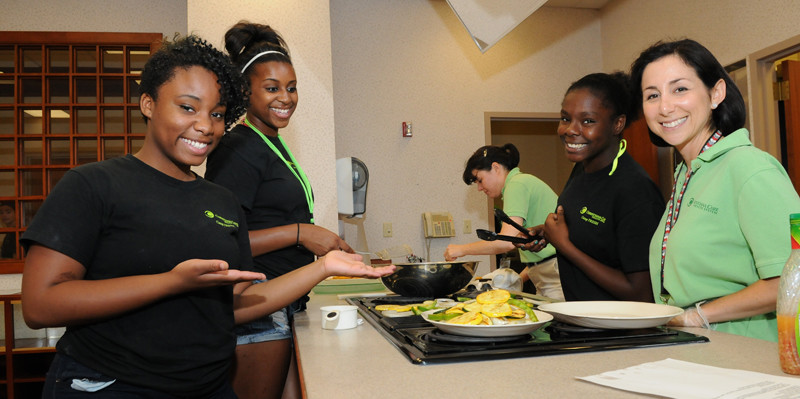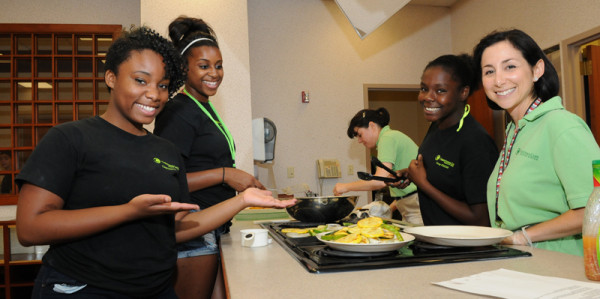AstraZeneca HealthCare Foundation renews grant for No Heart Left Behind


Christiana Care received a $213,094 grant by the AstraZeneca HealthCare Foundation’s Connections for Cardiovascular HealthSM program on Feb. 6 for its No Heart Left Behind program during a special event at Thomas Jefferson University Hospital in Philadelphia, Pa.
This marked the third consecutive year in which Christiana Care’s Center for Community Health has received a grant from the AstraZeneca HealthCare Foundation for a total of $561,577. No Heart Left Behind aims to engage teens to increase their knowledge and confidence in their ability to make healthy lifestyle changes and connect with community-based resources. The program teaches teens skills to also improve the heart health and weight management of their mothers or other important adults in their lives.
“Thanks to No Heart Left Behind, we teach teenagers not only why it is important to engage in physical activity and healthy eating, both which can reduce their later risk of heart disease, but we also teach them how to partner with their mothers or another important female figure in their life,” said Michael Rosenthal, M.D., chair of Christiana Care’s Department of Family & Community Medicine. “We know when families can encourage one another to eat healthy and engage in physical activity, they are more likely to stick to those healthy habits over time.”
“The biggest advantage to our program is that we are reaching teenagers before they have developed unhealthy habits,” added Omar Khan, M.D., associate vice chair for Christiana Care’s Department of Family and Community Medicine and medical director for both the Eugene duPont Preventive Medicine & Rehabilitation Institute and the Center for Community Health at Christiana Care. “Funding from the AstraZeneca HealthCare Foundation has helped our program not only improve the lives of teens, but of their peers and their families.”
During the last two years, the No Heart Left Behind program doubled participants’ weekly exercise to four days per week from two days a week. By the program’s completion, teen participants drank five fewer sugar-sweetened drinks per week.
The program also has educated more than 3,000 adults and teens on ways to prevent heart disease through outreach activities as a result of previous funding from the AstraZeneca HealthCare Foundation.
“The program has helped us interact with our parents more,” said Greg Graves, a graduate of the program and whose brother is currently in the program. “We talk about how when we eat well we feel well. We also make grocery lists with our mother so she can be sure to add foods that we enjoy and are heart healthy.”
Heart disease accounts for 23 percent of deaths in Delaware and 25 percent of deaths in Pennsylvania according to the Centers for Disease Control and Prevention.
The Connections for Cardiovascular Health program annually awards grants of $150,000 or more to U.S.-based nonprofit organizations dedicated to improving cardiovascular health in communities across the United States. This year, the program awarded nearly $3.7 million in grants to 19 organizations. More than $14 million in grants have been awarded through the program since its inception in 2010. Rep. Ed Osienski (D-Newark) and Rep. Earl Jaques (D-Glasgow) attended the event. The No Heart Left Behind program is carried out at Christiana Care’s school-based health centers within their districts.
“Cardiovascular disease remains the leading cause of death in the United States, and organizations like these two are creating innovative programs to help prevent and decrease the associated risks with this devastating disease,” said James W. Blasetto, M.D., MPH, FACC, chairman of the AstraZeneca HealthCare Foundation. “We are grateful to these organizations for their commitment to improving heart health in their communities.”
The Connections for Cardiovascular HealthSM grant also awarded $209,800 to The Food Trust in Philadelphia, which seeks to increase access to healthy foods at corner stores.
The Connections for Cardiovascular HealthSM was launched in 2010 through a charitable contribution of $25 million from AstraZeneca.